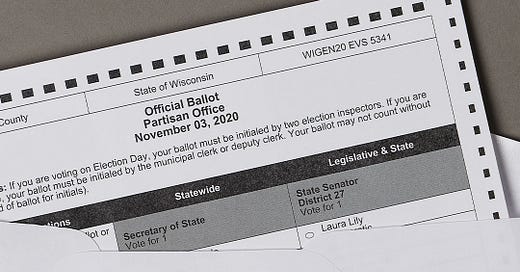Ahead of Spring Elections, Wisconsin Court of Appeals Issues Decision on Absentee Voting
District II vacated an injunction requiring WEC to provide digital ballots to print-disabled voters.
This morning, District II of the Wisconsin Court of Appeals issued its decision in Disability Rights Wisconsin v. Wisconsin Elections Commission, No. 2024AP1298. In the 14-page decision authored by Judge Gundrum and recommended for publication, the court vacated a temporary injunction entered by the Dane County Circuit Court which had directed WEC to make electronic ballots available to print-disabled voters. As enacted, Wisconsin’s election laws restrict delivery of electronic ballots to military and overseas absentee voters only.
In election litigation, the headline is often more interesting than legal analysis underlying the decision—and so it is here. To secure a temporary injunction in Wisconsin, the party seeking the injunction must satisfy four criteria: “(1) the movant is likely to suffer irreparable harm if an injunction is not issued, (2) the movant has no other adequate remedy at law, (3) an injunction is necessary to preserve the status quo, and (4) the movant has a reasonable probability of success on the merits.”1 Here, the court of appeals focused its analysis entirely on the third requirement—preservation of the status quo.
The legislature first opened the door to electronic delivery of absentee ballots in 2000, enacting a law that authorized clerks to deliver absentee ballots to “a facsimile transmission number or electronic mail address.”2 At the time, there was no restriction on who could utilize this ballot delivery option. However, with the enactment of 2011 Wis. Act 75, the legislature scaled back the availability of electronic ballot delivery, limiting it to military and overseas voters only. Since 2011, Wisconsin law has required all absentee voters who are not military or overseas to utilize paper ballots. Act 75 was subject to litigation in federal court but was ultimately upheld by the Seventh Circuit in 2020.3
In this case, a group of plaintiffs headlined by Disability Rights Wisconsin sued WEC, alleging that Act 75 is unlawful as to print-disabled absentee voters and violates the American with Disabilities Act, the Rehabilitation Act, the Wisconsin Constitution’s provision for secret balloting, the Wisconsin Constitution’s equal protection clause equivalent, and the First and Fourteenth Amendments of the United States Constitution.
After filing their complaint, Disability Rights Wisconsin sought a temporary injunction directing WEC to make electronic delivery of absentee ballots available to print-disabled voters. Judge Everett Mitchell of the Dane County Circuit Court granted the injunction, ordering WEC to make electronic ballot delivery available for print-disabled voters and ruling that such ballots must be capable of being marked electronically.
On appeal to District II, the court of appeals stayed Judge Mitchell’s temporary injunction, and Disability Rights Wisconsin filed an unsuccessful petition to bypass the court of appeals.
In its decision this morning, the court of appeals made quick work of the temporary injunction, holding that it was not necessary to preserve the status quo. The court noted that Act 75 has been in effect since 2011 and was upheld by the Seventh Circuit in 2020. As such, Act 75’s provision limiting electronic ballot delivery to military and overseas absentee voters is the status quo. Judge Gundrum’s decision explained:
[H]ere the status quo is the law as enacted in Act 75 in 2011. . . . It is the same status quo clerks and voters have been operating under for years. And, it is the same status quo under which, according to their affidavits, the print-disabled Plaintiffs have successfully cast their votes time and time again for the last fourteen years since the enactment of Act 75. That status quo—the status quo—only permits the electronic delivery of absentee ballots to military and overseas voters, no one else. What Plaintiffs sought through a temporary injunction and what the circuit court gave them through its orders was a wholesale change of the status quo, not the preservation of it.
There’s nothing too groundbreaking about this analysis. Preservation of the status quo has long been a component of a temporary injunction analysis. However, it is a useful reminder that courts should proceed cautiously when considering whether to invalidate a longstanding election statute at the preliminary injunction stage of a case.
Gahl ex rel. Zingsheim v. Aurora Health Care, Inc., 2023 WI 35, ¶17, 413 Wis.2d 418, 989 N.W.2d 561 (quoting another case).
Wis. Stat. § 6.87(3)(d) (1999-2000).
See Luft v. Evers, 963 F.3d 665, 676-77, 681 (7th Cir. 2020).




